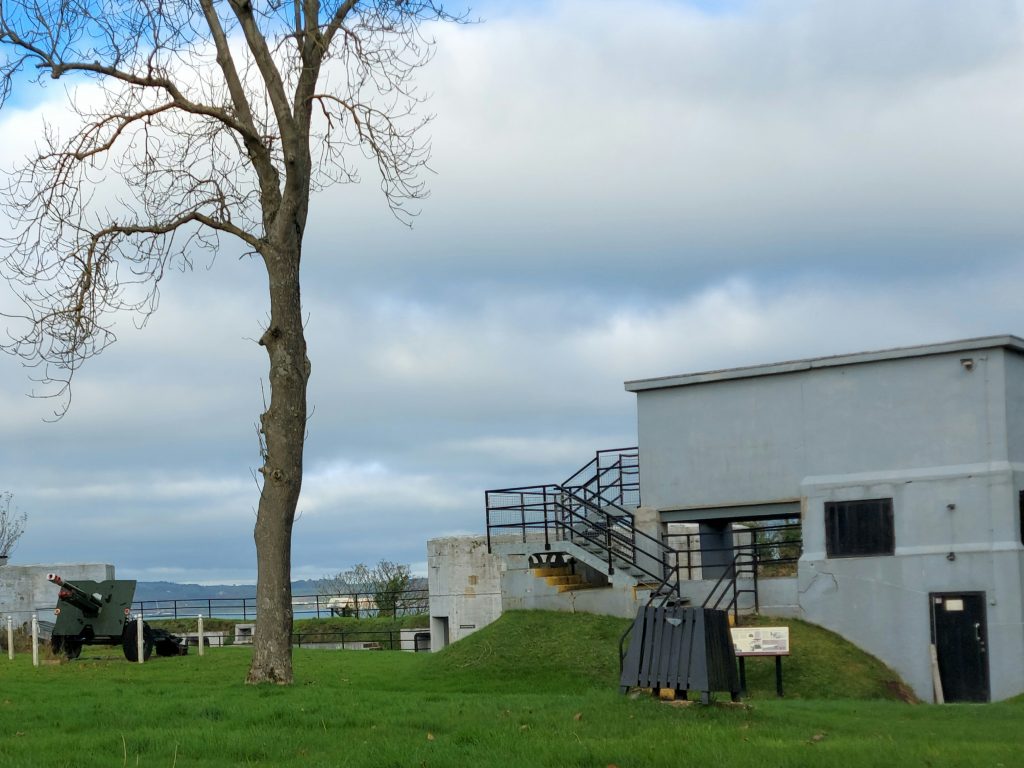Northern Ireland Curriculum Links
Below you will find suggestions to engage students with oral histories and the Second World War.
Is there a Second World War site near you?
Is there a Second World War site in Northern Ireland still visible near you?
You can still see Grey Point Fort – where Maureen Lightbody worked in signals – today.

Or do you have a family object or photograph from the Second World War?
Take a photograph of the site or object and research some information about it.
If you’d like to submit your photo and research to our website, we may add it to Your Stories.
You can contact us on this website or at searchlightstories@nmni.com.
Conduct an interview: record your own oral history
Recording an oral history is a good way to develop skills in planning, research and active listening.
Tips and tricks for recording an oral history
Define your topic
- Be clear about your subject and share this in advance with your interviewee. It might be about school life in the past, women in the workplace, or the local impact of climate change.
- Defining your topic will help you shape your research and it is fairer to your interviewee to set clear limits
- State your topic again at the beginning of the interview
Planning and preparation
- If you plan to record the interview, practise beforehand and get your interviewee’s permission
- Don’t get into detail when you set up your interview, or you may find your interviewee feels you already know everything and they won’t tell you again as fully
- Make sure you have a quiet place for your interview
- Think of some key questions to ask
Asking good questions
- Start with an easy question to relax your interviewee and get them talking
- Your questions should be as broad as possible. Avoid closed, yes/no questions
- Don’t fire a lot of questions but take your cues from your interviewee
- Use good follow up questions
Active listening
- Your role is to encourage rather than cross-examine
- Listening receptively is important – if you show interest people will keep talking
- Maintain eye contact and think about positive body language
Keep them talking
- Don’t show off your knowledge, or your interviewee may feel they have little to tell you
- Don’t interrupt and don’t put words into their mouths
- If your interviewee falls silent you can try comments such as ‘You were saying that…’ to help them recapture their train of thought
Finally
- Make clear what you plan to do with your interview. You will need to get the interviewee’s permission if you want to share it in any way. Sharing with your school class may be acceptable but an older generation may not be happy with social media.
- Thank your interviewee for taking time to share their experiences with you
Northern Ireland Curriculum Links
Keystage 2: The World Around Us
#HomeFront
Listen to ‘’The Sound That Will Never Leave You’ on the Belfast Blitz page
Glenn Patterson’s story is based on the real-life experiences of two children and with headphones you can get the full immersive sound experience.
Listen to the Belfast Blitz tour on the Belfast Blitz page
It describes the impact of the Luftwaffe raids on the Cathedral Quarter in Belfast and tells the stories of ARP wardens, nurses, firemen and others on the Home Front.
Nearly one thousand people died in the Belfast Blitz so there is some reference to death and injury, and teachers and parents may wish to listen first before sharing with young children.
Keystage 3: Environment and Society, History
#ImpactOfWar #MediaAwareness #WomenAndWork #EthicalAwareness #HeritageTourism
#EthicalAwareness
Read the story of refugee Alice Berger Hammerschlag, and listen in Voices to accounts of the Holocaust, Refugees and Bystanders.
Discuss: Do you think all Germans supported the Nazis? Do you think they had any choices?
Discuss: Some anti-vaccine protestors today have been wearing yellow stars, like those Jewish people were forced to wear. Do you think the situation of these protestors is comparable to being Jewish during the Holocaust?
#MediaAwareness
Discuss: Read Bob Marsden’s account of ‘crossing the Rhine’ in Voices. Do you think this kind of propaganda is acceptable in war? What are the arguments for and against?
#HeritageTourism
Find a Second World War site near you. Take a photograph and send us some information about it for Your Stories.
Keystage 4: GCSE History Northern Ireland and its Neighbours, 1920-49
#NeutralEire #TheBlitz #ContributionOfNorthernIreland
#ContributionOfNorthernIreland
Research Northern Ireland’s industrial, agricultural, military and strategic contributions to the war. You should be able to find a number of references to Northern Ireland’s industrial and strategic contribution, and some evidence of its military and agricultural contribution.
You will find evidence in the stories of Alice, Cecil, Kenneth and Maureen; the Belfast Blitz tour; and Voices.